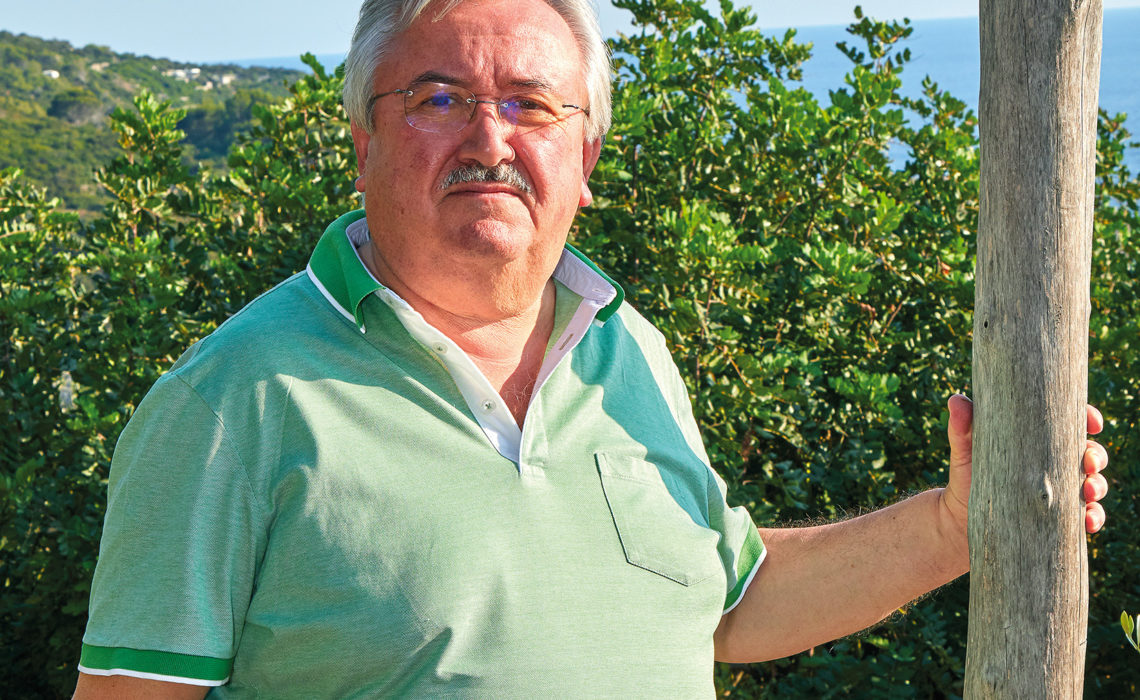“L’Oro di Capri è l’identificazione di un sodalizio composto da un gruppo di persone (ancora troppo piccolo) animate dalla passione di produrre un buon olio. Qualche amico mi ha detto che siamo nostalgici e inseguiamo un’iniziativa antieconomica. Di contro a questi ho risposto che per me sono superficiali ed effimeri. L’Oro di Capri, infatti, è anche un’indole ad una vocazione, per l’ambiente e per l’agricoltura, che la comunità di Anacapri ancora sente. In particolare, per me, parteciparvi ha significato riprendere una passione che deriva dai miei genitori, in una chiave di modernità e con un rigore scientifico. Grande merito va agli amici e soci dell’associazione che hanno proposto l’iniziativa ed hanno dato vita al nostro gruppo. Per me è un onore farne parte e mi auspico possa crescere al punto di vedere proliferare ogni lembo di uliveti esistenti sull’isola, in particolare ad Anacapri”.
“Penso che, anche solo un litro di olio, sia oro. Nelle coltivazioni di uliveti, che curo tra via Faro e la Fabbrica, vedo ancora tronchi scavati e secchi e vorrei fare in modo che questi fusti tornino in vita. Ammazzare una pianta di ulivo è come compiere un delitto verso l’ambiente”.
“Oggi, la sfida sta nel coinvolgere i giovani con politiche adeguate allo sviluppo del ritorno alla terra. Bisogna cercare di motivare le nuove generazioni dando luce ad un piano di sviluppo del settore agricolo. Una possibilità la si potrebbe creare ad esempio istituendo una sezione agraria dell’istituto di scuola superiore. Il problema a cui assistiamo oggi è proprio l’assenza di conoscenze tecniche e teorie della materia; gran parte di ciò che si fa, avviene grazie alle conoscenze pratiche dei vecchi agricoltori ma vanno formate le nuove generazioni. Merito dell’associazione è stato stimolare tentativi di scolarizzazione nel campo, come corsi specifici sulla produzione di un olio biosostenibile, la potatura, il monitoraggio degli uliveti, ma è necessario che la politica intervenga, creando una consapevolezza. Istruendo le nuove generazioni nel campo agricolo si potrebbe generare un indotto competente per valorizzare questo patrimonio. Fondamentale è creare una minima aspettativa economica intorno al progetto”.
“La coltivazione dell’olivo, di per sé, non richiede un grosso impegno lavorativo sulla terra. Ciò che necessita è attenzione, monitoraggio ed un maggiore sforzo concentrato nella stagione del raccolto. È naturale che la coltivazione degli ulivi generi un valore positivo sia per la terra che per l’ambiente”.
Young people and the land
An interview with Antonino De Turris for Oro di Capri
“Oro di Capri is the identification of a cooperative formed by a (still too small) group of people moved by the passion for producing high-quality olive oil. Some friends of mine have told me we are nostalgic, and we pursue an antieconomic initiative. Conversely, I replied them that I believe they are superficial and ephemeral. Oro di Capri, as a matter of fact, is also the inclination for a calling, for the environment and agriculture, that the community of Anacapri still feels. Particularly, for me, taking part in this group has meant recovering a passion I inherited from my parents, reinterpreted in a modern key and with scientific rigor. Great credit must go to the friends and members of the organization who have proposed the initiative and have formed this group. For me, being part of it is an honor and I hope it can grow to the point of seeing every field of olive grove proliferate on the island, especially in Anacapri”.
“I believe that even just a liter of oil, is gold. In the olive groves, that I manage between via Faro and Fabbrica, I can still see dry, hollowed-out trunks and I would like to work so that these trunks can return to life. Killing an olive tree is like committing a murder against the environment”.
“Today, our challenge is involving young people with policies aimed at the return to the land. We need to motivate the new generations by promoting a development plan in the agricultural sector. One possibility could be created, for example, by establishing an agricultural section in high school. The issue we are facing today is exactly the lack of technical knowledge and theory on the subject; large part of what must be done is possible thanks to the practical knowledge of the old farmers, but the new generation must be educated as well. Merit of the organization was encouraging attempts for schooling in the field, such as specific courses on the production of bio-sustainable oil, pruning, monitoring of olive groves, yet it is necessary for politics to intervene, creating a common awareness. By teaching the new generation on the agriculture subject we could have positive repercussions to add value to these assets. It is fundamental to create even small economic expectations around this project”.
“The cultivation of olive tree, per se, does not require much work on the land. What it needs is care, monitoring and a major concentration during harvesting season. It is natural that the olive groves cultivation creates positive value for both the land and the environment”.









No Comments